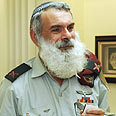
Rabbi Ronsky
צילום: דובר צה"ל
Rabbi Ronsky’s dismissal
IDF rabbi’s replacement politically motivated, missed opportunity for debate
Following the 2005 Gaza disengagement and the damaging effect it had on the morale of many religious soldiers, Rabbi Avichai Ronsky was brought in to replace Rabbi Yisrael Weiss as the new IDF chief rabbi. As a resident of Samaria and a former combat soldier, Rabbi Ronsky was appointed with the expectation that he would help restore some of the lost morale.
Looking back over the four years that he served in the job, it appears that Rabbi Ronsky succeeded quite well. Unlike other military rabbis who usually focus solely on religious issues such as kashrut, he made great strides to strengthen the fighting spirit of the soldiers. This approach was best demonstrated during Operation Cast Lead in Gaza when the rabbi, leading by example, called for other rabbis to accompany the soldiers into battle.
Basing his approach on the biblical example of the priests, he claimed that a rabbi is an integral part of the combat unit and as such must remain with the soldiers and help them overcome whatever difficulties they might have in order to triumph in battle. Reflecting quite a change from his predecessors, this approach was lauded at the time by most soldiers, military rabbis and citizens as well.
Nonetheless, without much fanfare, Ehud Barak decided not to extend Rabbi Ronsky’s term. In the eyes of Barak, Rabbi Ronsky was apparently not the usual “yes man” rabbi content with dealing with smaller religious issues; rather, he was trying to instill a real Jewish spirit into the Israeli army.
Although objectively quite beneficial for the Jewish people, for Barak such an approach was apparently intolerable. The various incidents of religious soldiers refusing orders over the last few months only strengthened Barak’s belief that this growing Jewish spirit was a threat and as such Rabbi Ronsky had to be replaced. Moreover, with an eye to the future amidst more and more calls for a two-state solution, it was clear to Barak that a chief rabbi like Ronsky would be problematic should soldiers once again be called upon to remove Jews from their homes.
Thus, the unprecedented step of not extending Rabbi Ronsky’s term was taken and Rabbi Rafi Peretz was recently made the new IDF chief rabbi. The fact his appointment was supposedly influenced by Elazar Stern, the former head of the IDF’s manpower division, only strengthens the suspicion surrounding Ronsky’s dismissal. This is the same Stern who made himself persona non grata in large parts of the religious community for his unswerving support for the Gaza disengagement, his harsh talk against religious soldiers refusing orders to evacuate Jewish settlements, and his aggressive threats to fully integrate the segregated hesder yeshivot units into mainstream army units in order to water down the ideological intensity of hesder groups.
Where was the outcry?
Hence, the question that remains is “where was the outcry”? How was Barak able to take the unparalleled step of changing the chief IDF rabbi, a move that was pregnant with meaning and purely political, yet barely a voice was raised in protest?
For starters, why wasn’t Barak challenged? After all, he is the head of a shrunken political party that barely received 10% of the vote in the last elections. Why has no one stated this publicly and thus questioned his right to wield such power and to seemingly do as he pleases? How can Ehud Barak, who only represents a very small part of Israel’s population, be allowed to undertake such a move without there being any opposition or protest?
In addition, why didn’t anyone question the assumption that there was a direct link between Rabbi Ronsky’s approach and the various cases of insubordination on the part of some religious soldiers? More importantly, even if the assumption was right, why have there been such few voices stating that the real problem is neither insubordination nor the words of Rabbi Ronsky or any other rabbi for that matter, but rather, the ongoing politicization of the Israeli army by people like Ehud Barak?
For even without the obvious problem of requesting a Jewish soldier to do something that clearly contradicts Jewish law, the continued use of the army for political means should be sending shockwaves throughout society. Once again, why are voices continually quiet to this blatant infringement of the political echelon into the army?
Finally, why is there no response to the many well-intentioned voices saying that any insubordination, be it from the Right or the Left, is wrong, when clearly this line of reasoning is flawed? Since the publicly stated mission of the IDF is “To defend the existence, territorial integrity and sovereignty of the state of Israel. To protect the inhabitants of Israel and to combat all forms of terrorism which threaten the daily life”, then soldiers who refuse to be engaged in activities which have nothing to do with these goals are clearly not doing anything wrong.
However, a soldier who says that he will not serve across the “Green Line” is clearly in the wrong since his job it to protect the inhabitants of Israel wherever they live. Although it is his right as a private citizen to disagree with the existence of Jews living in Judea and Samaria, as a soldier he cannot choose whom he will and will not defend.
In summary, Barak’s handling of Rabbi Ronsky's dismissal was the perfect opportunity to raise many of the abovementioned points. For this reason it’s a shame that the whole episode transpired with barely a whimper.










